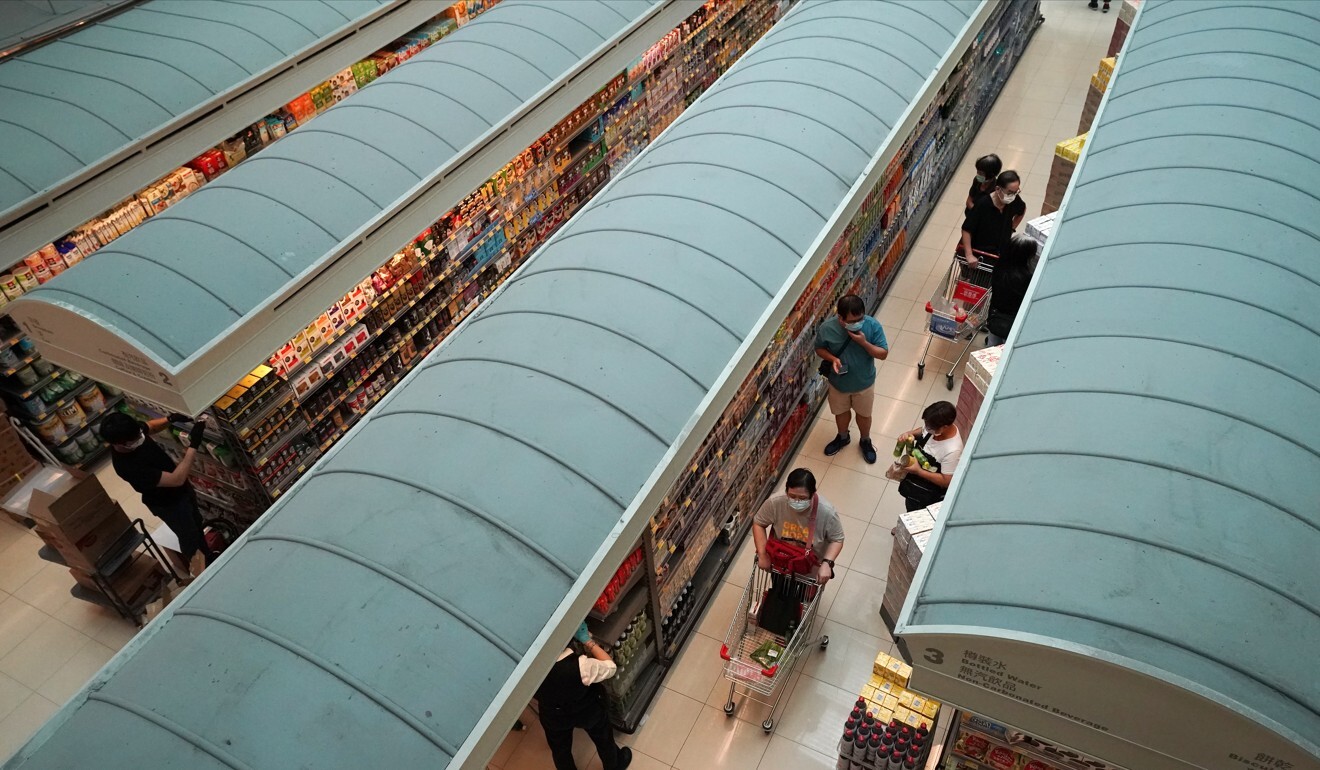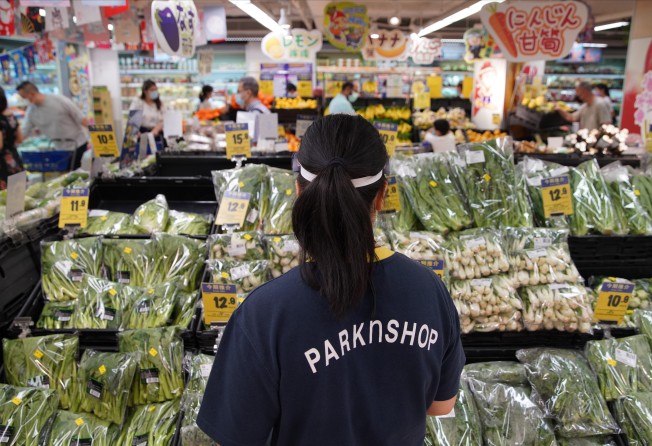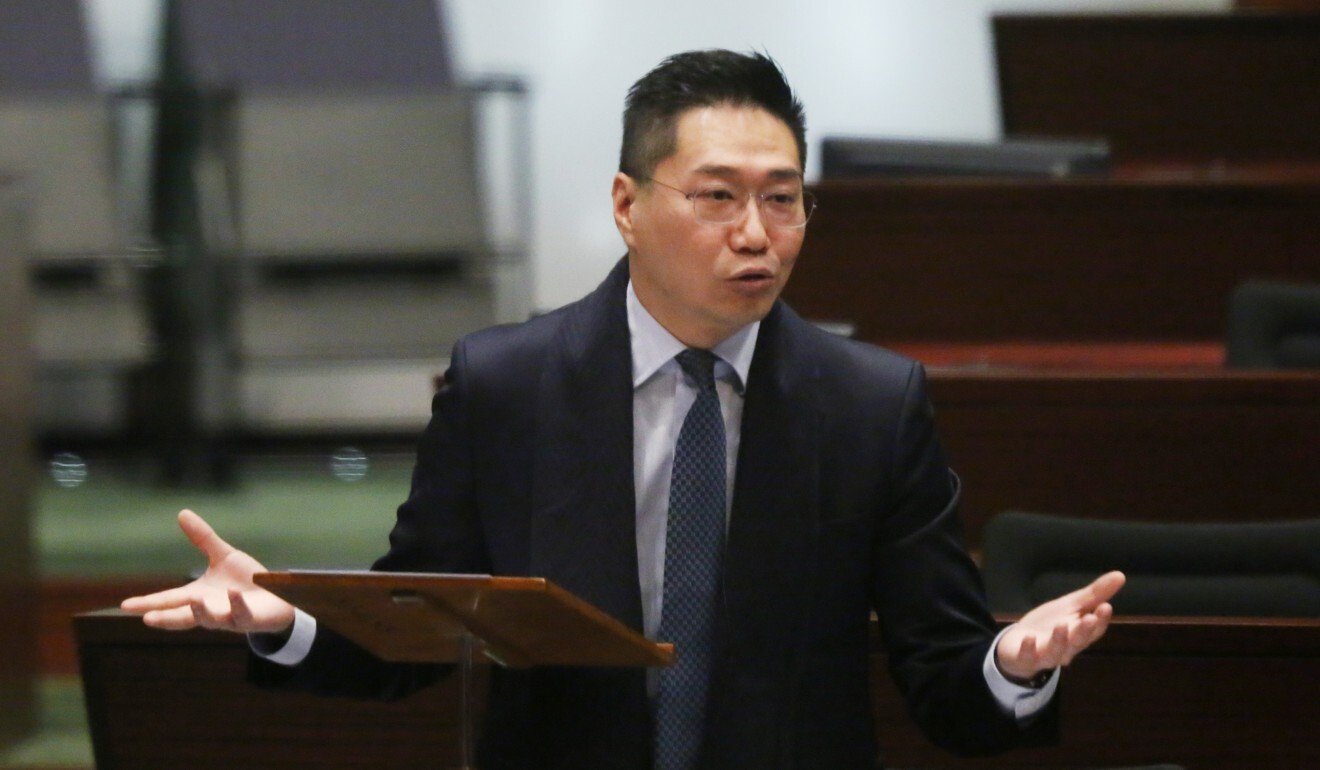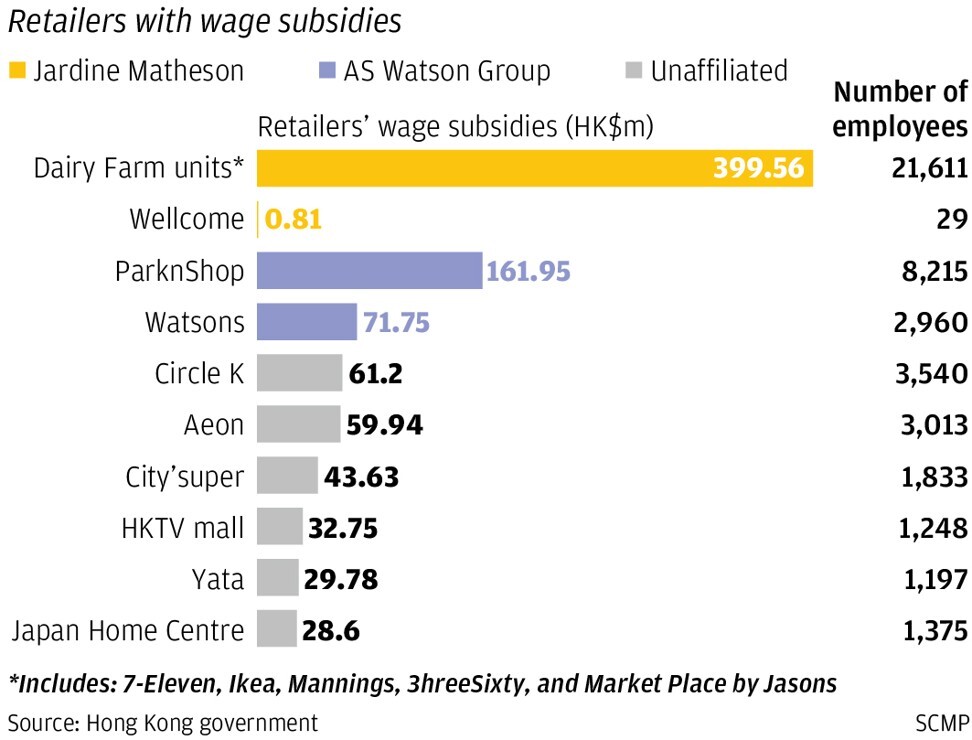
‘Little logic’ in forcing Hong Kong’s biggest supermarkets to pass subsidies onto consumers through discounts during coronavirus crisis
- Supermarkets are one of the few businesses thriving in the pandemic, yet the city’s two largest, ParknShop and Wellcome, have tapped deeply into the wage fund pool
- The government’s plan for them to give back to a struggling public with lower prices is being criticised as a bureaucratic mess that ignores simpler solutions

A decision by the Hong Kong government to compel the city’s two biggest supermarket chains that benefited from wage subsidies to pass on gains in the form of discounts to shoppers has riled welfare groups and even pro-establishment lawmakers who attacked it as a roundabout solution.
Retail and wholesale lawmaker Shiu Ka-fai on Wednesday lambasted the new requirement suddenly imposed by the government in the second tranche of the HK$81 billion wage subsidy scheme as an unnecessarily complicated redistribution method to a simple problem, while legislator Alice Mak Mei-kuen of the Federation of Trade Unions (FTU) called it a “laughable” strategy.
Chief Executive Carrie Lam Cheng Yuet-ngor told privately owned ParknShop and Wellcome supermarkets on Tuesday to give back to society if they applied for the second instalment of the government’s HK$81 billion (US$10.3 billion) subsidy scheme between September and November. She did not spell out exactly how they would be required to do so. The government said it had invited the two companies to discuss next week how the offers might work.

While the two retailers each pocketed more than HK$100 million in the first round of subsidies between June and August, they have yet to indicate whether they would seek fresh aid designed to help industries retain jobs amid the Covid-19 crisis.
“The government has raised a question, which led to hundreds more questions,” said Shiu of the Liberal Party. “It’s originally a simple solution – give out cash vouchers and that’s the end of it.”
He said monitoring any perks the companies offered would be challenging. “Does the government have so much time to spare to compare prices of, say, lemon tea and Coca-Cola? It’s a waste of time. The supermarkets will tell you their products have become cheaper, but how do you prove that?” he said. “The government always comes up with strange and baffling things.”
Secretary for Labour and Welfare Law Chi-Kwong said ParknShop and Wellcome each received at least HK$100 million in subsidies in the first phase of the scheme even though their businesses were performing well.
Supermarkets are among the few sectors that have thrived during the pandemic, bucking a 33 per cent slump in retail sales in Hong Kong in the first six months of the year over the same period in 2019. In June, supermarket sales rose 4.5 per cent compared to last year, following similar growth of 7.3 per cent in May, 14.4 per cent in April, 16.1 per cent in March, and 11.1 per cent in February and January combined.
ParknShop – part of AS Watson controlled by tycoon Li Ka-shing – collected HK$162 million in wage subsidies between June and August for at least 8,215 employees. Wellcome’s parent, Dairy Farm, which is part of Jardine Matheson and runs 7-Eleven stores in Hong Kong, received nearly HK$400 million in the same period for its 21,611 workers.
A ParknShop spokeswoman said its 260 stores had increased the number of promotional items by 5-10 per cent on popular products such as noodles, frozen food and sanitiser between February and July.
She said the import cost of these products from Britain, the United States and Australia jumped between 30 and 50 per cent since March from a year ago after the company switched from sea shipments to air freight to replenish stocks faster. ParknShop bears the extra freight costs, she added.
The chain also donated surplus food to NGOs such as Food Angel and offered discounts to the elderly every Wednesday, she said.
The ParknShop spokeswoman said the price of imported eggs from Thailand and the US had jumped by double digits, with the price of US eggs doubling during March-May compared with the same period last year. The company, meanwhile, had raised the sale price of the commodity by only 5-10 per cent, she said, adding that the inflation on eggs was still at least 5 per cent higher at present.
A Wellcome spokesman said the group, with 331 stores, donated 10,000 packs of hygiene and food products and 100,000 meal vouchers to vulnerable groups.
NGO ChickenSoup Foundation called for the government’s new requirement for wage subsidy to be applied to all supermarkets in the city given many local neighbourhoods did not have a ParknShop and Wellcome store.
“There are more families on limbo as parents are laid off, can’t find any jobs and need to take care of their kids stranded at home,” said the group’s chief incubator Cindy Chow On-ting, adding it had handed out more than HK$300,000 in supermarket cash coupons to over 200 families during the pandemic. “We have come across a family of three, who have only HK$6 in their pockets.”

Billy Mak Sui-choi, an associate professor at Baptist University’s department of finance and decision sciences, said the new requirement was meant by the government to discourage bigger firms doing well during the crisis from tapping into the fund pool.
Knut Fournier, chairman of the Hong Kong Competition Association and a lecturer at the University of Law in Hong Kong, said imposing the new conditions on the city’s largest supermarkets would have a bigger impact on consumers than demanding the same of smaller shops.
“Although it may seem unfair for the government to impose conditions on some companies and not others in order to receive subsidies, this may be justified by considerations of scale and efficiency,” Fournier said.
Everyone is coming up with cash vouchers. I can’t understand why the government couldn’t have thought of that
But Alice Mak of the FTU said the government should avoid complicating the situation. It could simply set aside some of the subsidy for cash vouchers to be distributed through the Community Care Fund, a public charitable trust.
“It’s not that the government doesn’t understand the issue; its solution is quite amusing,” Mak said. “You wouldn’t feel it’s helpful to citizens. Everyone is coming up with cash vouchers. I can’t understand why the government couldn’t have thought of that.”
Gabrielle Kirstein, CEO of the NGO Feeding Hong Kong, said the pandemic had worsened the plight of the city’s 1.4 million people living in poverty. Donating supermarket coupons would be an invaluable addition.
“It will take a joint effort – from the government, corporates and the NGO sector,” Kirstein said. “Equally important is the need for a coordinated effort.”
The subsidy programme, known as the Employment Support Scheme, distributed HK$43.9 billion to 140,000 employers – covering 1.9 million workers – between June and August, with the remaining HK$37.1 billion available through application beginning August 31. Hong Kong’s unemployment rate hovered at a 15-year high between the rolling three months of May and July, at 6.1 per cent compared with 6.2 per cent between April and June.
